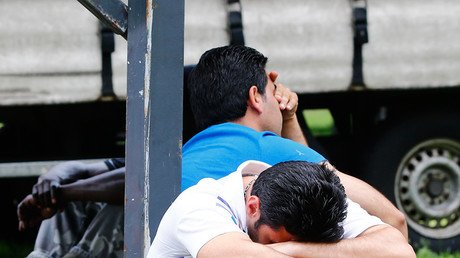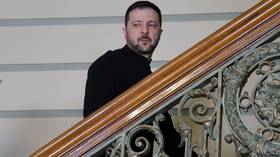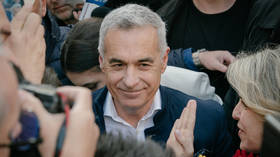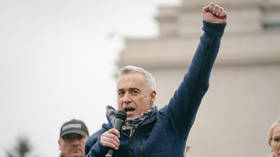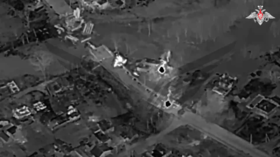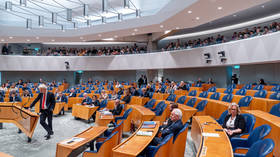Activists in German town protest mosque construction with crosses (VIDEO, PHOTOS)
Wooden crosses several meters high have been installed by a group of protesters at a site in Erfurt, in the German region of Thuringia, where a local Muslim community plans to build a mosque.
In early March, the first 10-meter-high wooden cross was erected on a piece of private land owned by the local Muslim Ahmadiyya community. It was set up by a group called ‘Bürger für Erfurt’ (Citizens for Erfurt), aided by the anti-immigrant club ‘Ein Prozent’ (One Percent) from neighboring Saxony, which published a video-report of the action on its Facebook page.
Marbacher, ihr seid klasse! #Erfurt#DefendEuropepic.twitter.com/TR2M8hS7b6
— Simon Wald (@Wald_Simon_) March 5, 2017
The cross was later torn down by unknown persons, but re-erected shortly afterwards by the initiators – along with six more wooden crosses of varying sizes. The move came after the Ahmadiyya community announced plans to construct a mosque on the undeveloped grounds in a commercial zone in Erfurt-Marbach – the first such building in Thuringia.
Currently there are only a number of prayer rooms in several towns across the region. The building application is to be submitted to the municipal administration in the coming weeks, according to the local MDR news outlet.
Commenting on the incident, Erfurt mayor Katrin Böhlke said that legally the town’s authorities cannot act against the crosses’ installation, as they are not set up on the town’s land. She added, however, that she has been negotiating with activists, urging them to stick to peaceful protests.
“We talk with the citizens again and again. Legally, one cannot act against the crosses. It is not an urban area and is not governed by the town’s Agriculture Department. We can only appeal again and again that any protests against the mosque construction are peaceful,” Böhlke told MDR. She noted that the issue would surely be discussed at the next meeting of the district council.
Und ich dachte tatsächlich, die Zeit der Kreuzzüge sei vorbei... so viel zum Missbrauch religiöser Symbolik gegen den #Moscheebau#Erfurtpic.twitter.com/Kh3qRNOcdk
— AstridRothe-Beinlich (@Astrid_RB) March 6, 2017
A spokesman for the Ahmadiyya community in Erfurt, Mohammad Suleman Malik, said the community does not see the crosses themselves as provocative.
“The cross is not a provocation. On the contrary: It would be nice if churches, synagogues and mosques stood side by side. We would welcome a church construction in Marbach in the immediate vicinity [of the planned mosque],” Malik told Thuringen24. He was astonished, however, that “opponents expressing their aversion for the mosque’s construction through this action would utilize a religious symbol like this.”
Two major Thuringian churches have condemned the protest in a joint statement, speaking out “against abuse of the cross as a battle sign.”
“Whoever uses the cross to [protest] other thinking or other faiths misuses this Christian symbol. The [action] has nothing to do with the Christian message of charity and even love.“Our basic law is clear here: religious communities have the right to freely exercise their religion, and this right is also true when religion is expressed in architecture. We as Christian Churches welcome the mosque construction in Erfurt. Those who question the freedom of religion should ask themselves whether they act within the precepts of our basic law,” the Evangelical Church of Middle Germany and the Catholic Diocese of Erfurt said in a joint statement issued earlier this week.
The crosses also came under fire from local politicians, with the head of the Thuringian State Chancellery, Benjamin Hoff, tweeting: “Whoever wants to protest with a cross symbol against the mosque construction in Erfurt-Marbach does not understand anything about Christian charity.”
“And I actually thought the time of the Crusades was over…so much to the abuse of religious symbolism against the # mosque building # Erfurt,” local Greens Party Parliamentary Director and Erfurt Councilor Astrid Rothe-Beinlich tweeted.
Even among the locals opinions differ as to whether it is appropriate to protest against the mosque. A local citizen told RT’s Ruptly that the protest is justified.
“I think this is a justified protest. The citizens of Erfurt, who are against the construction of the mosque, should be able to express the protest in a peaceful manner,” he stated. Another man said he does not oppose the mosque personally, but understands the reasons for the action.
“I personally am not scared of the mosque’s construction. But I understand that the Marbach population is worried, that through the construction of a mosque the structure of the population will change in a few years, like we have seen in Berlin’s Kreuzberg, in Duisburg’s Marxrloh or in Brussels’ Molenbeek, where the indigenous population is being pushed out and have to leave their place. Because a mosque is always a ‘train station’ at the same time, where many people settle around it," he stated. Yet another local resident suggested further that in order to evade conflicts the town “should carry out a poll or a referendum like in Switzerland and then accept the decision of the population.”
Germany has seen an unprecedented rise in Islamophobic sentiments in recent months, attributed to the high number of Muslim refugees coming to the country as a result of German Chancellor Angela Merkel’s open-door policy. According to a study conducted last year, more than 40 percent of Germans believe Muslims should be forbidden from coming to their country. The number is significantly higher from 2009, when just one-fifth expressed the same sentiment.
Germany saw more than 3,500 attacks against refugees and migrants in 2016, with up to 10 assaults a day, according to a report by the interior ministry, citing police statistics. There were nearly 1,000 instances of shelters for refugees and asylum-seekers being targeted, including arson attacks.
Also, the German anti-Islam movement Pegida, headquartered in Dresden, has been increasingly active and gaining numbers, staging protests across the country against Muslims and other immigrants. The most recent large rally was held a month ago in Dresden at the unveiling of a memorial dedicated to the victims of the battle for Aleppo. Pegida supporters called the memorial erected by a Muslim sculptor “degenerate art” and slammed the mayor as “traitor of the nation” for allowing it to be built.
READ MORE: ‘Wars of religion will start in Europe’ – Turkish FM

